Dependent Clauses: Adverbial, Adjectival,
Dependent clauses may work like adverbs, adjectives, or nouns in complex sentences.1. Adverbial clauses
Like a single-word adverb, an adverbial clause describes a verb (in the sentence's main clause) and answers one of these questionswhere? why? how? when? to what degree?
An adverbial clause begins with a subordinating conjunction, which makes the clause subordinate (dependent).Common subordinating conjunctions:
|
after
|
in order (that)
|
unless
|
|
although
|
insofar as
|
until
|
|
as
|
in that
|
when
|
|
as far as
|
lest
|
whenever
|
|
as soon as
|
no matter how
|
where
|
|
as if
|
now that
|
wherever
|
|
as though
|
once
|
whether
|
|
because
|
provided (that)
|
while
|
|
before
|
since
|
why
|
|
even if
|
so that
|
|
|
even though
|
supposing (that)
|
|
|
how
|
than
|
|
|
if
|
that
|
|
|
inasmuch as
|
though
|
|
|
in case (that)
|
till
|
Example of adverbial clause answering when?
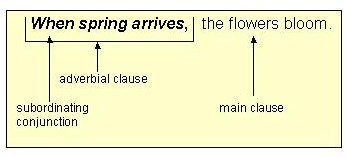
When will the flowers bloom? Answer: when spring arrives
Example of adverbial clause answering why?
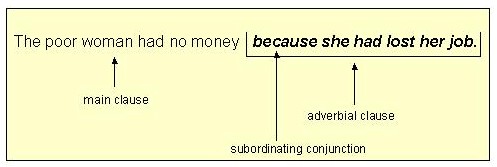
Why didn't the poor woman have money? Answer: because she had lost her job
Example of adverbial clause answering where?
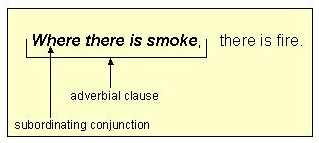
Where is there fire? Answer: where there is smoke
Example of adverbial clause answering how?
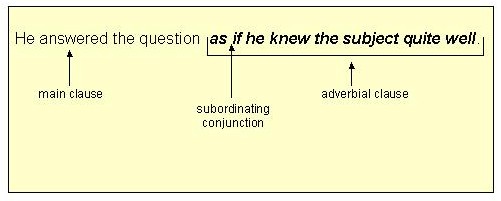
How did he answer the question? Answer: as if he knew the subject quite well
Example of adverbial clause answering to what degree?
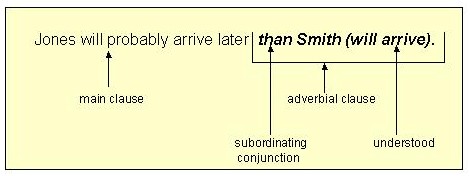
To what degree of lateness will Jones arrive? Answer: (later) than Smith (will arrive)
Another example of an adverbial clause answering to what degree?
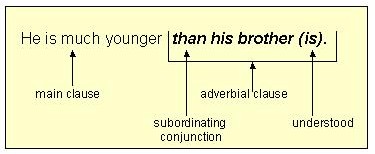
To what degree is he young? Answer: (younger) than his brother (is)
Comma use with adverbial clauses
Comma use with adverbial clauses depends upon placement of the adverbial clause.If the adverbial clause introduces the sentence, place a comma between it and the main clause.

If the adverbial clause follows the main clause in a sentence, do not place a comma between the two.

2. Adjectival clauses
Like a single-word adjective, an adjectival clause describes a noun (in the sentence's main clause) and answers one of these questionswhich one? what kind?
An adjectival clause usually begins with a relative pronoun, which makes the clause subordinate (dependent).Common relative pronouns:
that which who whom whose
NOTE: Use who, whom, and whose to describe people.
Use that and which to describe things.
Adjectival clauses always follow the person, place, or thing they describe, usually immediately.
Example of adjectival clause answering which one?
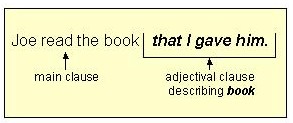
Which book did Joe read? Answer: the one that I gave him
Example of adjectival clause answering what kind?
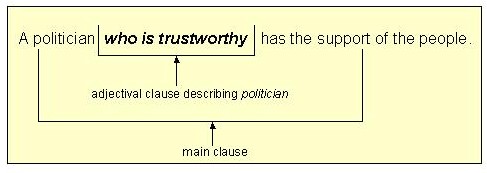
What kind of politician has the support of the people? Answer: one who is trustworthy
Adjectival clauses may also begin with selected subordinating conjunctions:
when - to describe a time

where - to describe a place
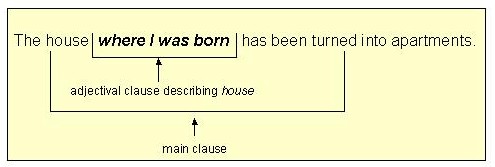
why - to describe a reason
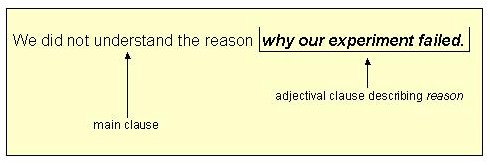
Comma use with adjectival clauses
Comma use with adjectival clauses depends upon essentiality of the adjectival clause.If the adjectival clause is essential (or "needed"), no commas should be used to separate it from the main clause.
Generally, essential adjectival clauses should not begin with which.
Examples
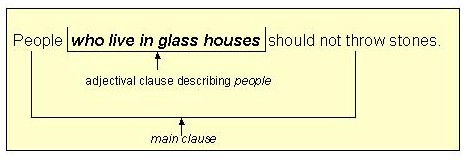
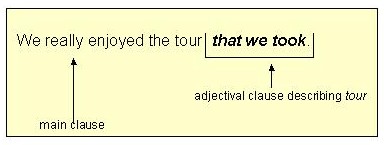
Since the adjectival clauses in the above examples are needed to clarify the noun that they describe, they are essential and should not be separated from the rest of the sentence with commas.
If the adjectival clause is nonessential (or "not needed"), commas should separate it from the main clause.
Nonessential adjectival clauses should not begin with that.
Examples


Since the adjectival clauses in the above examples are not needed to clarify the noun that they describe, they are nonessential and should be separated from the rest of the sentence with commas.
Note the difference between the sentences in each pair:
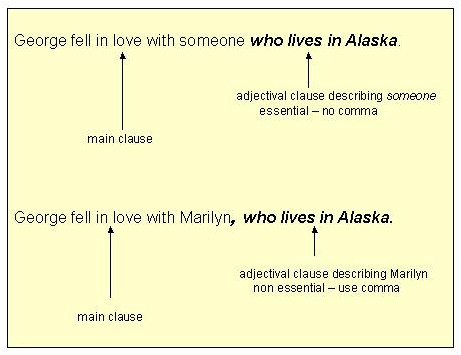
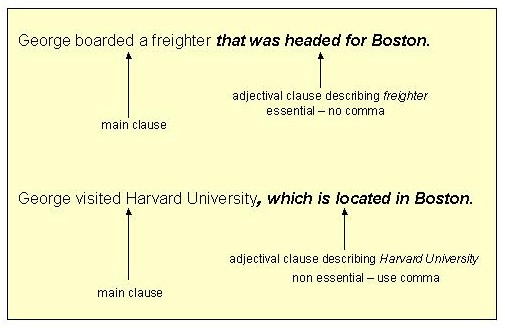
3. Nominal Clauses
Like a noun, a nominal clause names a person, place, thing, or idea. A nominal clause may function in a sentence as any of the following:subject subjective complement appositive object of preposition direct object indirect object retained object
Nominal clauses may begin with interrogatives:
who whom what which whoever whomever whatever when where how why
An interrogative beginning a nominal clause has a function within the nominal clause.
Each of the following examples illustrates
- a nominal clause
- the function of the nominal clause within the sentence
- the function of the interrogative within the nominal clause
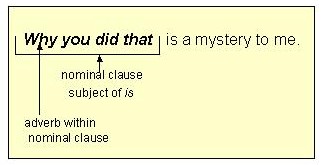
Nominal clause as subjective complement in sentence
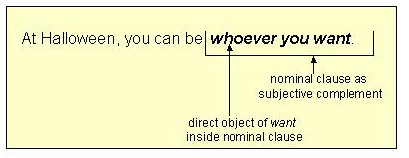
Nominal clause as object of preposition in sentence
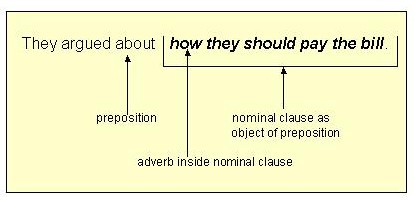
Nominal clause as direct object in sentence
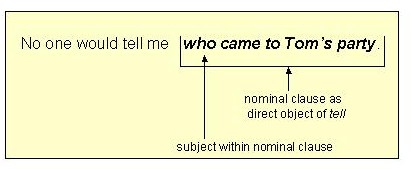
Nominal clause as indirect object in sentence
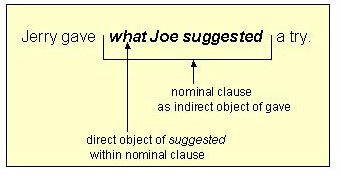
Nominal clause as retained object in sentence
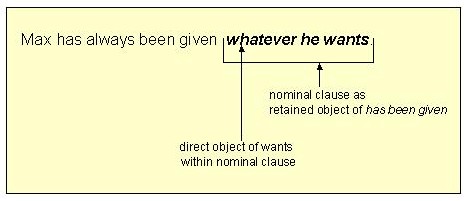
Nominal clauses may also begin with expletives:
that whether if
An expletive beginning a nominal clause has no function within the nominal clause.
Nominal clause beginning with expletive that
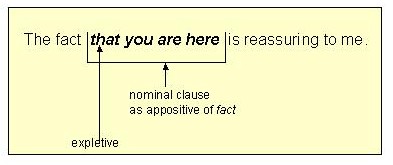
Nominal clause beginning with expletive whether
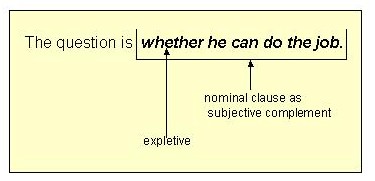
Nominal clause beginning with expletive if
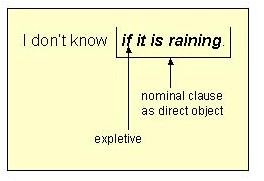

ليست هناك تعليقات:
إرسال تعليق